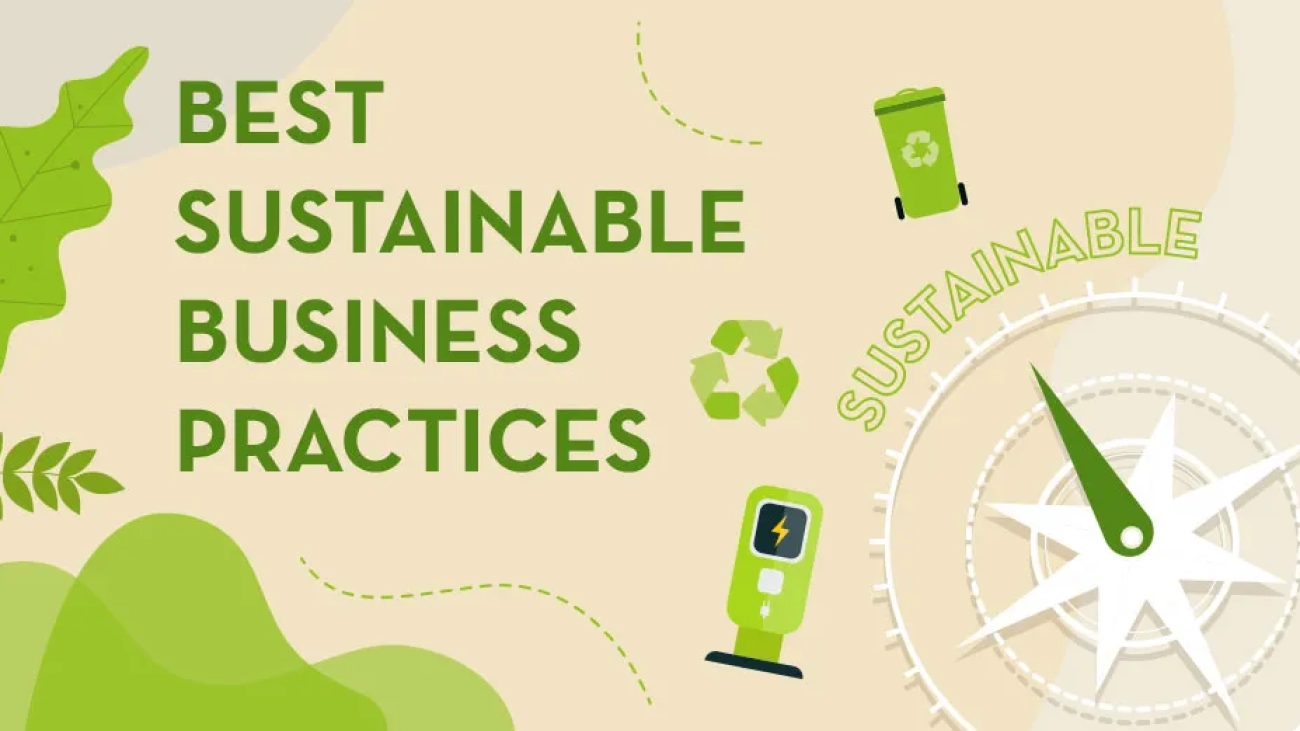Discover the power of sustainable practices in business. Eco-friendly strategies that drive profits & purpose, benefitting both your bottom line & the planet!
Greening the Bottom Line: How Sustainable Practices Drive Profits and Purpose in Business
In today’s rapidly evolving business landscape, the pursuit of profit is no longer the sole objective of enterprises. As consumers and investors become more environmentally and socially conscious, businesses are realising the importance of integrating sustainable practices into their operations. The adoption of sustainability principles not only benefits the planet and society but also proves to be a powerful driver of profitability and purpose. In this article, we will explore the profound impact of sustainable practices on businesses, analysing how they contribute to both the bottom line and the greater good!
Understanding Sustainability and Profit
To comprehend the potential correlation between sustainability and profit, it is crucial to define the concept of sustainability in business. Sustainability refers to the responsible management of resources and processes that aim to meet the needs of the present without compromising the ability of future generations to meet their own needs. Profit, on the other hand, is the financial gain earned from the business’s operations.
When these two seemingly distinct ideas intersect, businesses find a unique opportunity to create long-term value for all stakeholders, including customers, employees, shareholders, and the community at large.
Sustainable Practices: Catalysts for Increased Profitability
-
Resource Efficiency and Cost Reduction
Implementing sustainable practices often entails optimizing resource usage, be it energy, water, or raw materials. By adopting energy-efficient technologies, businesses can reduce operational costs significantly. For instance, investing in smart LED lighting like Philips and energy-efficient machinery can substantially cut electricity expenses, resulting in higher profit margins.
Similarly, incorporating water-saving measures not only minimises environmental impact but also translates into reduced utility bills. Moreover, sustainable procurement practices ensure that resources are utilised judiciously, mitigating waste and curbing unnecessary expenses.

-
Attracting a Growing Market of Conscious Consumers
Today’s consumers are becoming increasingly discerning, seeking products and services that align with their values of sustainability and social responsibility. Studies have shown that a significant portion of consumers are willing to pay a premium for eco-friendly and socially conscious offerings.
By embracing sustainable practices, businesses can tap into this lucrative market segment, expanding their customer base and boosting sales. As word spreads about a business’s commitment to sustainability, customer loyalty and brand reputation are further enhanced, fostering long-term profitability.
-
Mitigating Risks and Ensuring Long-Term Viability
Sustainability also serves as a risk mitigation strategy, safeguarding businesses against environmental and social uncertainties. Climate change, resource scarcity, and changing regulations are among the many challenges that can disrupt business operations and profitability.
Companies that proactively integrate sustainability into their strategies are better equipped to adapt to these changes, ensuring their long-term viability and resilience in the face of adversity. Such foresight is especially vital for industries heavily reliant on finite resources, as it ensures continuity even as supplies dwindle.
Now that we have explored how sustainable practices drive profits, let’s delve into the various aspects that make a business both sustainable and profitable.
What Makes a Business Sustainable and Profitable?
Creating a sustainable and profitable business necessitates a holistic approach that extends beyond short-term financial gains. Here are some key factors that contribute to the success of sustainable enterprises:
-
Visionary Leadership and Corporate Values
To embed sustainability into the fabric of a business, it must be championed from the top-down. Visionary leadership that values environmental and social responsibility sets the tone for the entire organisation. When sustainability becomes an intrinsic part of the corporate culture, it guides decision-making processes, encouraging responsible practices at all levels.
-
Innovation and Adaptability
Innovation plays a vital role in driving sustainability and profitability. Businesses that invest in the research and development of sustainable products and services can gain a competitive edge in the market. Sustainable innovations can lead to cost savings, increased efficiency, and novel revenue streams, enhancing overall profitability.
Additionally, adaptability is crucial for sustainable businesses. Markets and consumer preferences change over time, and companies that embrace flexibility can pivot and thrive in evolving landscapes.
-
Stakeholder Engagement and Collaboration
Sustainable practices in business necessitate collaboration among various stakeholders, including employees, suppliers, customers, and the local community. Engaging stakeholders in sustainable initiatives not only fosters a sense of ownership and loyalty but also generates innovative ideas for sustainable solutions. Through collaboration, businesses can address shared challenges and drive positive change on a larger scale.
Having explored the aspects that make a business sustainable and profitable, let’s move on to the next section, which highlights the importance of social sustainability in driving business success.
Social Sustainability: A Cornerstone of Business Success
While environmental sustainability often takes centre stage in discussions about sustainable practices, the importance of social sustainability cannot be understated. Social sustainability encompasses the well-being of employees, communities, and society at large. Here’s why it is a crucial aspect of driving business success:
-
Attracting and Retaining Talented Employees
In today’s competitive job market, attracting and retaining top talent is essential for business growth and innovation. To put it into simpler words, this translates to a little more than just head hunting on LinkedIn. Prospective employees increasingly seek employers that prioritise social responsibility and employee well-being.
Businesses that prioritise social sustainability by offering fair wages, employee development opportunities, and a positive work environment are more likely to attract skilled individuals. Moreover, a satisfied and engaged workforce translates into increased productivity and reduced turnover, which positively impacts the bottom line.
-
Enhancing Brand Reputation and Customer Loyalty
A socially responsible business is more likely to earn the trust and loyalty of its customers. Consumers tend to support companies that demonstrate a commitment to social issues and ethical practices. When customers associate a brand with positive social impact, they are more likely to remain loyal to that brand, even in the face of competition.
By actively contributing to the well-being of the community and society, businesses can build a strong brand reputation, leading to increased customer advocacy and sustainable profitability.
-
Contributing to Community Development
Businesses play a significant role in shaping the communities they operate in. Embracing social sustainability means actively contributing to community development initiatives, such as education programs, environmental conservation efforts, and poverty alleviation projects.
When businesses invest in the betterment of their local communities, they create a positive social impact that goes beyond financial gains. A thriving community can lead to improved living conditions, increased purchasing power, and a broader customer base for the business.
Now that we have explored the importance of social sustainability, let’s move on to the specific benefits of adopting sustainable practices in business.

Benefits of Business Sustainability
-
Long-Term Cost Savings
Sustainable practices often involve reducing waste, optimising resource usage, and adopting energy-efficient technologies. These measures can lead to substantial cost savings over time, enhancing a company’s profitability. For example, installing solar panels to generate renewable energy can result in significant long-term reductions in electricity expenses.
-
Enhanced Brand Reputation and Market Differentiation
Consumers and investors increasingly prefer to associate with socially and environmentally conscious brands. By adopting sustainable practices, businesses can differentiate themselves in the market, appealing to a growing segment of conscious consumers.
A strong brand reputation as a sustainable and responsible entity can also attract socially responsible investors, providing access to additional funding and capital.
-
Compliance with Regulatory Requirements
As governments and regulatory bodies worldwide focus on sustainability and environmental protection, businesses must comply with evolving regulations. Adopting sustainable practices ensures that businesses stay ahead of compliance requirements, avoiding potential penalties and reputational damage.
-
Access to New Market Opportunities
Incorporating sustainability into business strategies can open doors to new market opportunities. Many governments and organizations offer incentives, grants, and contracts to businesses that demonstrate a commitment to sustainability.
By tapping into these opportunities, businesses can diversify their revenue streams and expand their market presence, bolstering their bottom line.
-
Risk Mitigation and Resilience
Sustainable practices enable businesses to anticipate and mitigate potential risks arising from environmental and social challenges. By being proactive in their approach to sustainability, businesses can build resilience, ensuring their ability to navigate disruptions and economic downturns.
To Sum Up …
The fusion of sustainable practices and profitability is transforming the business landscape, propelling enterprises towards a more purpose-driven future. By understanding the significance of sustainability and profit, businesses can capitalise on the potential benefits of incorporating sustainable practices into their operations!


Add a Comment